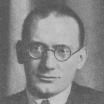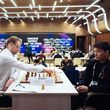Person of day - 21 NOVEMBER 2023
ERNST GRÜNFELD

At the start of the 1920s, Austrian grandmaster Ernst Grünfeld was one of the top chess players in the world. It was during that period when he demonstrated his finest performances, like his victories at the 23rd Congress of the German Chess Union, tournaments in Vienna (twice), Budapest, Margate in 1923 (ahead of Alekhine and Bogolyubov), Ostrava and Merano. In 1925, Grünfeld took part in the first Moscow International Tournament, but did not perform particularly well, splitting 9-10 places with A. Ilyin-Genevsky. That same year, in a large tournament in Baden-Baden that was brilliantly won by Alekhine, Grunfeld took 8th place. He competed in notable tournaments for a long time, but he is better known in chess history as a theoretician rather than a player.
In the 1920s, when chess saw the rise of hyper-modernist ideas pioneered by Nimzowitsch and Reti, there emerged original concepts, based on a new approach to the rile of the centre and the ability of figures to pressure it. There ideas formed the foundation of principally new debuts- the defences of Nimzowitsch, Alekhine and Grünfeld.
Grünfeld first tried out his defence in matches against Becker and Kostic in 1922. With time, it gained popularity and was taken up by multiple extraordinary chess players of different generations, including world champions such as Botvinnik, Smyslov, Fischer, Karpov, Kasparov and Anand. The enriched Grunfeld’s defence with valuale strategic innovations and contributed to its evolution.
Ernst Grünfeld died in April 1962 in Vienna.



















